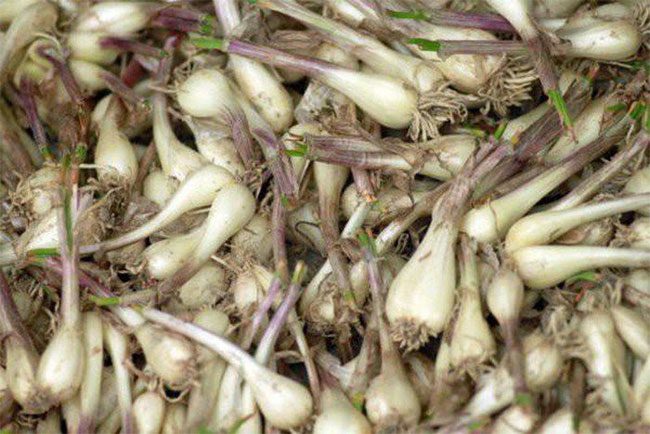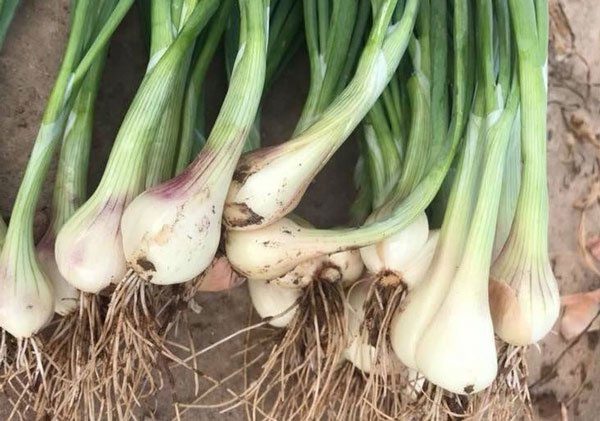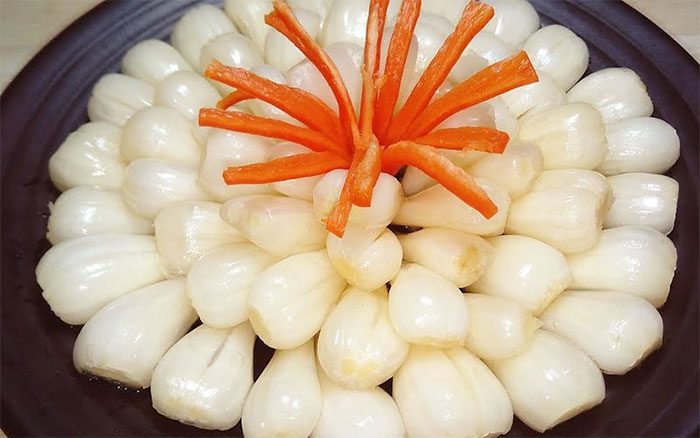Shallots are a familiar dish in every family, especially during the Lunar New Year. However, many people are unaware of the health benefits that shallots can bring if used correctly.
Understanding Shallots
What are shallots? Characteristics and how to distinguish them from fresh onions
Shallots have various names such as “jiè qiú” or “cò kiệu.” In traditional Chinese medicine, they are commonly referred to as “jiè bái,” belonging to the onion family, with the scientific name Allium Chinense G.Don. Shallots are the bulbous part of the shallot plant, white in color and swollen like an onion but smaller.
How do shallots differ from onions?
How can we distinguish onions from shallots since they are quite similar and both belong to the onion family? Primarily, we can differentiate them by size and shape.
- Onions are larger and whiter compared to shallots.
- The shallot plant has a white bulb, oval shape, with leaves growing at the base, measuring 15 – 60 cm long and 1.5 – 4 mm wide. The flower cluster is compound umbellate on a flower stem 15 – 60 cm long, bearing 6 – 30 flower clusters in pink or purple). Shallots are white, round or elongated like onions but are generally smaller, with many thin scales covering the outside.
Both have the same spicy and pungent flavor, and you can identify them through the images below:

Image of shallot plant.

Fresh onion.
Nutritional value of shallots
In terms of nutritional value, shallots contain many nutrients, specifically:
- Water
- Carbohydrates
- Protein
- Cellulose
- Minerals such as calcium, magnesium, phosphorus, iron, copper, manganese, strontium, and zinc
- Carotene
- Vitamin C and 16 types of amino acids (Lysine, alanine, methionine, arginine, glutamate, gamma-aminobutyric acid, B-serine, aspartyl threonine, leucine, isoleucine)
Additionally, shallots also contain sulfur compounds (sulfides, disulfides, trisulfides, and tetrasulfides with ethyl, butyl, and pentyl groups). These substances contribute to the unique flavor of shallots.
Other components include saponins (steroid saponins, furostanol saponins like chinenosides II and III, spirostanol steroids), nitrogen-containing compounds, amino acids, polysaccharides, sulfur, organic acids, nitrogen, and flavonoid compounds. Flavonols include quercetin and quercetin glycosides.
Medicinal benefits of shallots
According to traditional Chinese medicine, shallots have a spicy taste and warming properties; they affect the lung, stomach, and large intestine meridians, providing benefits such as nourishing qi, warming the spleen and stomach, promoting yang, and dispersing stagnation, which is primarily used to treat chest pain, restlessness, cough with phlegm, dry vomiting, chronic bronchitis, chronic gastritis, dysentery with tenesmus, and painful boils. Eating shallots helps against cold and promotes digestive health.
In traditional Chinese medicine, shallots are believed to relieve mental stress, heart issues, and tumors, and are often included in some medicinal formulations.
Modern medicine recognizes the potential benefits of shallots as follows:
1. Excellent antioxidant and anti-inflammatory properties
Plants in the onion family, including shallots, have strong antioxidant effects beneficial for the body. The abundant Quercetin in shallots helps slow down the growth of harmful cells, preventing cancer, and eliminating harmful free radicals. Moreover, the flavonoids in shallots promote the production of glutathione, a potent antioxidant, which is extremely beneficial for health.
2. Supports cardiovascular health
A scientific study has shown that individuals who regularly consume plants from the onion family, including shallots, have over a 60% reduced risk of cardiovascular disease. This is because the antioxidant compounds in shallots, such as Quercetin, help prevent plaque accumulation in blood vessel walls, thus reducing the risk of stroke and better protecting cardiovascular health.
3. Prevents cancer risk
The active compound laxogenin found in shallots is highly effective against cancer cells. Additionally, the strong antioxidants in shallots also destroy harmful free radicals, preventing the development of cancer. Shallots can be used to effectively prevent lung cancer and stomach cancer.
4. Treats diarrhea and dysentery
When pickled, shallots can help treat diarrhea and dysentery, as well as common indigestion. Fermentation adds beneficial bacteria to the shallots, and combined with anti-inflammatory and antibacterial compounds, these beneficial bacteria help prevent digestive diseases.
5. Reduces cholesterol and enhances blood circulation
Pickled shallots contain lactic acid, which helps reduce cholesterol levels in the blood. This, in turn, helps reduce plaque in blood vessels and enhances blood circulation. The risk of cardiovascular diseases and strokes is significantly reduced. This is one of the most trusted effects of shallots.
6. Provides essential nutrients for the body
Shallots are rich in beneficial vitamins such as vitamins A, D, E, and K. Additionally, they contain minerals like calcium, iron, and magnesium, which help improve overall health. The acids in pickled shallots help facilitate the absorption of these minerals.
7. Relieves colds and boosts immunity
Shallots, in general, have excellent properties for relieving colds. This is due to their spicy, warming nature, combined with compounds and vitamins that are effective in treating colds and flu. Furthermore, regular consumption of shallots can boost the body’s immunity due to their rich vitamin and mineral content.
Common remedies using shallots for healing
- Treating sore throat: Crush shallots and mix them with a little vinegar to apply to the sore area. Applying several times will help reduce sore throat.
- Treating diarrhea and dysentery: 9g of Bupleurum, 9g of shallots, 12g of white peony root, 4g of licorice, and 6g of immature bitter orange. Boil all ingredients together and drink daily for treatment.
- Treating allergic rhinitis: 6g of magnolia flower, 9g of shallots, 9g of prickly ash fruit, all boiled together to make a medicinal drink.
- Treating burns: Use crushed shallots, mix with honey, strain to apply to the skin.

Using shallots for medicinal purposes is very effective.
Harmful effects of pickled shallots
- Consuming too many pickled shallots can cause internal heat as they are spicy and warming.
- People with excessive phlegm should avoid pickled shallots as it may worsen their condition.
- Individuals suffering from headaches should also refrain from consuming pickled shallots as it may exacerbate their symptoms.
- Overconsumption of pickled shallots can lead to excess acid in the stomach, increasing the risk of ulcers and acid reflux.
Unexpected effects of onions and garlic
Why is going to the Moon today “hard” compared to 50 years ago?


















































